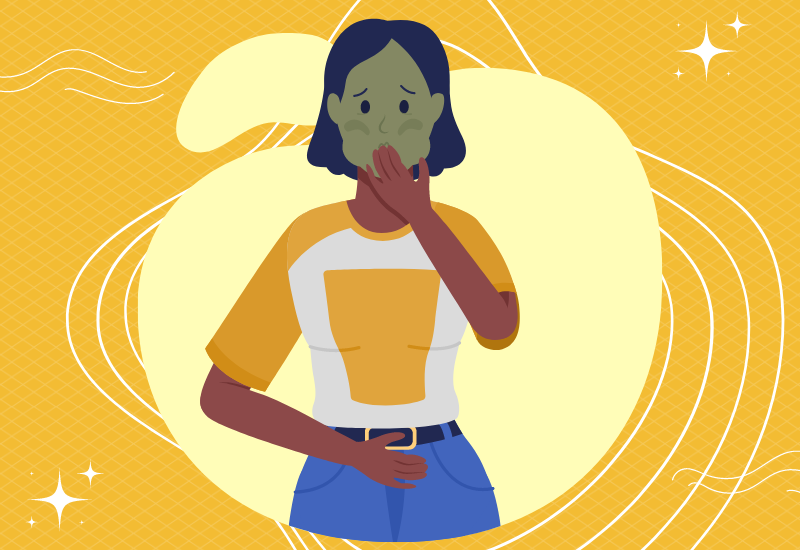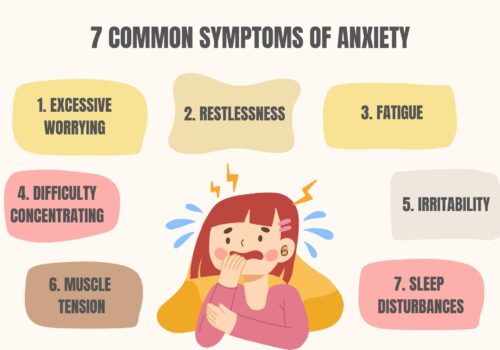Emetophobia is an intense, irrational fear of vomiting. An extreme fear of puking, seeing vomit, watching other individuals vomit, or even just feeling sick is known as emetophobia, a specific phobia. People who have emetophobia frequently experience anxiety and act out in ways that interfere with their daily lives. Emetophobia, or the excessive fear of vomiting, is a chronic and incapacitating condition marked by a propensity to avoid a wide range of situations or tasks that might make one more likely to vomit. Emetophobia is relatively challenging to treat, in contrast to numerous other subgroups of specific phobias.
Your daily life may be significantly impacted by this persistent distress. You can’t go out to eat, avoid travelling in crowded areas, avoid trying new foods, avoid being around sick people, or keep a close eye on your own health, for instance. Emetophobia has an impact on nearly every aspect of the lives of those who suffer from it.
Symptoms of Emetophobia
Emetophobia, like all phobias, usually develops gradually over time. You gradually avoid places and things that make you want to vomit. The more you attempt to avoid things, the more afraid you become. Eventually, fear takes control of your life.
- Words like “vomit” are difficult to describe or understand.
- Attempting to avoid hospitals or sick individuals
- Excessive usage of antacids as a preventive measure
- Attempting to avoid areas that made you feel ill
- Avoid watching vomit in films or on television.
- Concerned about the location of the restrooms
- Avoiding anything that stinks
- Trying to avoid dining out
These are some of the physical symptoms of anxiety and panic attacks. It can be difficult for someone who is afraid of vomiting to distinguish nausea and stomach pain from anxiety and depression.
Behaviors Of Individuals With Emetophobia

To be diagnosed as emetophobia, the avoidance response must be exceedingly distressing and adversely impact the individual’s life. People with emetophobia have a tendency to avoid situations or activities that they believe may increase the probability of vomiting.
- Dietary constraints
- Extensive handwashing and sanitation
- Checking food and expiration dates regularly.
- Observe any physical indicators of disease.
- Limiting travel or staying away from crowded public areas
- Avoid touching surfaces out of concern for the transmission of germs.
- Make sure you are aware of the location of restrooms when you are travelling.
- Avoiding sick individuals and possibly infectious environments
Everyone hates being unwell, but emetophobia is defined by excessive avoidance and terror. If this fear significantly interferes with a person’s everyday life, it may be labelled as a specific phobia. Excessive anxiety about vomiting can actually cause the symptoms one is attempting to avoid, like nausea.
Avoiding things that cause anxiety will simply make your emetophobia worse and prolong the problem. Frequent treatments for vomit phobia include behavioural therapies and exposure therapy, both of which involve gradually exposing oneself to the feared object. This may involve consuming certain foods, attempting to write the word “vomit,” drawing a picture of it, or viewing images of vomiting.
Affiliation Between Emetophobia And An Eating Disorder
Emetophobia can cause a person to consume very little and restrict their diet to a tiny proportion of “safe” foods, leading to malnutrition. Anorexia nervosa is incorrectly treated since a person with emetophobia will not strive for or have a distorted body image. However, the anorexic behaviour must be addressed first, particularly in teenagers and children. Major weight loss must be treated as a medical emergency, and hospitalisation and tube feeding are frequently necessary.
Obsessive-compulsive Disorder (OCD):
Emetophobia appears to frequently co-occur, in varying degrees, with OCD, particularly the contamination subset. Some people who experience emetophobia also experience other OCD symptoms like counting or checking.
Many emetophobics with OCD are upset about having “more than one thing wrong with them,” as they put it. We don’t fully understand how it behaves because there hasn’t been much study on the topic. Emetophobia is brought on by what trauma? It can appear suddenly or after a distressing episode of vomiting. Your risk may be increased if you have a family history of anxiety disorders or specific phobias. Because it exhibits some OCD symptoms, emetophobia and obsessive-compulsive disorder are closely related.
Many studies have found that people who have emetophobia are more likely to have panic disorder, anxiety disorder, depression, social anxiety disorder, or obsessive-compulsive disorder (OCD).
How to Overcome Emetophobia
The most effective methods for trying to treat vomit phobia are exposure and response prevention (ERP) and cognitive behavioural therapy (CBT). Correcting false beliefs, lowering avoidance, and gradually facing difficult situations are all part of treatment. The patient is given resources, a new perspective, a winning attitude, and a plan for overcoming their fears.
A person can learn to differentiate between anxiety and illness by addressing their anxiety with therapy, medication, or a combination of the two. This will help them regulate their panicked vomiting response. Anti-anxiety medication can aid in the treatment of panic’s physical symptoms. Exposure therapy is commonly used to treat emetophobia, which entails acclimating the patient to situations that enhance their fear of becoming ill. By reassuring them that vomiting is a rare event and that they can handle the embarrassment, cognitive behavioural therapy helps a person evaluate their illogical beliefs regarding the disease.
Emetophobia Self-Diagnosis:
The majority of emetophobic individuals can quickly diagnose themselves. The phobia manifests in childhood, at a very young age. Many people who are emetophobic can’t recall a time when they weren’t afraid of throwing up or vomiting. Below are the questions that you may ask yourself:
- Do you ever worry about getting sick or being exposed as sick?
- Have you ever had a fear of witnessing or hearing someone else vomit?
- Have you taken any significant precautions to lessen the possibility that you’ll contract a disease that interferes with your everyday life?
Anxiety UK strongly recommends that people talk to their doctor to get more information and advice. The doctor will also be able to give a formal diagnosis.
















